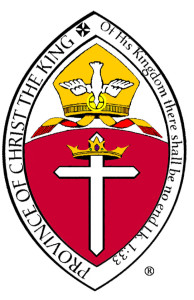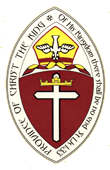The Anglican Province of Christ the King
In the aftermath of World War II, attacks upon the Christian faith concerned many Episcopalians. These attacks peaked in the 1976 General Convention in Minneapolis, Minnesota, when the Episcopal Church made sweeping changes, abandoning the liturgy, spirituality, and apostolic faith of the 1928 Book of Common Prayer. They allowed clergy to break their vows and renounce the doctrines and disciplines of the apostolic Church.
Inspired by the Holy Spirit, Episcopalian clergy and laity gathered in 1977 in St. Louis, Missouri. They issued the Affirmation of St. Louis, confirming orthodox Christianity. With the authority of the Affirmation, six parishes formed the Anglican Province of Christ the King, electing the Rev. Robert Sherwood Morse, rector of St. Peter’s, Oakland, as bishop. Father Morse was consecrated to the episcopacy by the requisite three bishops on January 28, 1978. The Rt. Rev. Albert A. Chambers, retired Episcopal Bishop of Springfield, Illinois, served as chief consecrator.
The Province of Christ the King has grown to three dioceses, maintaining a national cathedral in Georgetown, Washington D.C. and offices in San Francisco, Tulsa, and Washington D.C. In 1979, the Province of Christ the King established Saint Joseph of Arimathea Anglican Theological College in Berkeley, California. The Province embodies the historic Anglican faith that produced the King James Bible, writers such as William Shakespeare, T.S. Eliot, C.S. Lewis, and Dorothy Sayers, eleven U.S. presidents and most of our nation’s founding fathers.
Visit the APCK website at www.anglicanpck.org.
St. Joseph of Arimathea Chapel
With the founding of St. Joseph’s Seminary Chapel, a parish was formed. Students residing in the adjoining house help with Sunday services.
The American Church Union, our Anglican publishing house, is headquartered here, offering works for seminarians, parishes, clergy, and laity, both classic reprints and contemporary publications.
Located close to U.C. Berkeley campus, we offer choral Eucharists, liturgical processions, devotional organ music, and traditional hymns, all to the glory of God in this university setting, as a witness to historic Anglican Christianity.
St. Joseph of Arimathea
Joseph of Arimathea is described in Matthew 27:57 as a rich man from the town of Arimathea, northwest of Jerusalem. Mark 15:43 and Luke 23:50-51 identify Joseph as a member of the Sanhedrin (Israel’s ruling council). He was a secret follower of Jesus who, according to Luke, did not consent to the condemnation of Jesus. According to John 19:39, Joseph buried Jesus in Joseph’s new tomb, fulfilling Isaiah’s prophecy.
Tradition holds that St. Joseph of Arimathea, a sea trader in tin, brought the Holy Grail (the chalice of the Last Supper) to Glastonbury, England in the first century, founding English Christianity. Glastonbury traditions claim that Joseph was Mary’s uncle and thus related to Jesus.
The Eastern Orthodox and Roman Catholic Churches also venerate Joseph of Arimathea, linking the East with the West.
Welcome brochure for students, visitors and the Berkeley community: 2022.ST. JOSEPH’S COMMUNITY BROCHURE


